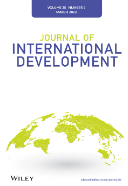Journal of International Development
While there has been increasing policy attention on broadening tax bases in low-income countries, taxing citizens in rural areas often leads to neither revenue gains nor stronger accountability outcomes. Through case studies of Sierra Leone and Togo, we demonstrate that revenue collection in rural areas is highly inefficient, leading to little, if any, revenue gains after factoring in collection costs. Accordingly, we question the existing rationales for extending taxation to rural citizens in low-income countries. Instead, we argue for a rethinking of the role of taxation in rural areas, considering the nature of social contracts and limited fiscal reciprocity.
